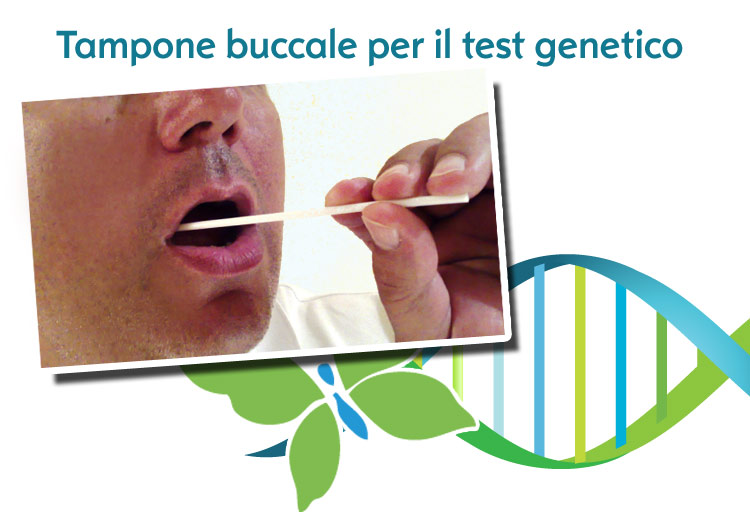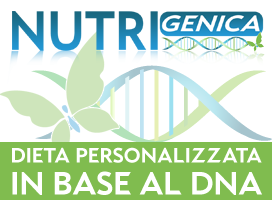
Nutrigenica - La dieta del DNA
Perché fare un test genetico?
Perché ogni individuo è unico e irripetibile.
Ci pensi bene: quando entra in un negozio di vestiti cerca i capi della sua taglia, che meglio si adattino alla sua struttura fisica; quando parte per il mare scegli la crema solare più adatta per la sua pelle. Per quale motivo, allora, non seguire anche un’alimentazione personalizzata, più consona al suo profilo genetico?
Ora sappiamo molte cose sul nostro metabolismo e su come il nostro organismo utilizza le sostanze nutritive, ma soprattutto sappiamo che alcune variazioni genetiche possono influire sui processi metabolici, determinando ad esempio il successo o l’insuccesso di una dieta dimagrante.

Sapeva che … ?
Si dice di mangiare 5 porzioni di frutta e verdura ogni giorno, ma per un italiano su due queste dosi non sono sufficienti a evitare danni al DNA.
Il 15% degli italiani è particolarmente sensibile ai grassi saturi e rischia di acquistare peso più facilmente, anche se si attiene alle dosi normalmente raccomandate.
Il 30% degli italiani ha una spiccata sensibilità ai carboidrati raffinati, e dovrebbe assumere la metà della quantità massima consigliata per la popolazione.
...E Lei che tipo di italiano è?

Test Genetico Diet
Il test è pensato per chi vuole seguire un programma alimentare personalizzato, che garantisca al proprio organismo le quantità corrette di macro e micronutrienti. E' la soluzione ideale per chi vuole perdere peso più rapidamente e mantenere il peso forma
conquistato. Il test è particolarmente adatto alle persone che più volte hanno provato, senza successo, a seguire una dieta dimagrante. In base all’analisi di 29 geni il test fornisce una tabella nutrizionale personalizzata, con le quantità giornaliere raccomandate per restare in forma e godere di buona salute il più a lungo possible.
Il test è grado di rivelare le sensibilità individuali ai grassi saturi, ai carboidrati raffinati e all’esercizio fisico. In questo modo, il tuo nutrizionista potrà prescriverti una dieta
personalizzata e quindi più efficace.
Test Genetico Fitness
Attraverso il Test Genetico Fitness riceverà consigli nutrizionali e di training, basati sull' analisi sia dei suoi processi di metabolismo muscolare, sia della sua capacità di recupero dagli esercizi.
Nel comprendere come il suo profilo genetico influenzi il suo benessere ed il suo potenziale di fitness, il Test Genetico Fitness la aiuterà ad avere un controllo diretto sull'ottimizzazione del suo potenziale attraverso un condizionamento mirato con l'apporto di nutrienti e di uno stile di vita il più congeniale possibile al suo profilo.
Grazie all'analisi genetica effettuata, Nutrigenica è in grado di offrirle consigli e raccomandazioni personalizzate in queste 8 aree:
- Profilo resistenza/potenza
- Potenziale aerobico: VO2max
- Cardiofitness
- Recupero post-allenamento
- Predisposizione agli infortuni
- Body composition
- Consigli nutrizionali
BIBLIOGRAFIA
1. Agarwal DP. Genetic polymorphisms of alcohol metabolizing enzymes. Pathol Biol. 2001. 49:703–9.
2. Ambrosone CB, Freudenheim JL, Thompson PA et al. Manganese superoxide dismutase (MnSOD) genetic polymorphisms, dietary antioxidants, and risk of breast cancer. Cancer Res. 1999. 59(3):602-6.
3. Ashfield-Watt PA, Pullin CH, Whiting JM, et al. Methylenetetrahydrofolate reductase 677C-->T genotype modulates homocysteine responses to a folate-rich diet or a low-dose folic acid supplement: a randomized controlled trial. Am J Clin Nutr. 2002;76:180-186.
4. Bathum, L, Petersen I, Christiansen L et al. Genetic and environmental influences on plasma homocysteine: results from a Danish twin study. Clin Chem. 2007. 53(5):971-9.
5. Bendlova B, Vejrazkova D, Vcelak J et al. PPARgamma2 Pro12Ala polymorphism in relation to free fatty acids concentration and composition in lean healthy Czech individuals with and without family history of diabetes type 2. Physiol Res. 2008. 57 Suppl 1:S77-90.
6. Brennan P, Hsu CC, Moullan N et al. Effect of cruciferous vegetables on lung cancer in patients stratified by genetic status: a mendelian randomisation approach. Lancet. 2005. 366(9496):1558-60.
7. Brown GW, Harris TO. Depression and the serotonin transporter 5-HTTLPR polymorphism: A review and a hypothesis concerning gene-environment interaction. J Affect Disord. 2008 Jun 3. [Epub ahead of print]
8. Brown S, Ordovas JM, Campos H. Interaction between the APOC3 gene promoter polymorphisms, saturated fat intake and plasma lipoproteins. Atherosclerosis. 2003. 170(2):307-13.
9. Brummett BH, Krystal AD, Ashley-Koch A, Kuhn CM, Züchner S, Siegler IC, Barefoot JC, Ballard EL, Gwyther LP, Williams RB., Sleep quality varies as a function of 5-HTTLPR genotype and stress. Psychosom Med. 2007 Sep-Oct;69(7):621-4.
10. Cai Q, Shu XO, Wen W et al. Genetic polymorphism in the manganese superoxide dismutase gene, antioxidant intake, and breast cancer risk: results from the Shanghai Breast Cancer Study. Breast Cancer Res. 2004. 6(6):R647-55.
11. Calder PC. Polyunsaturated fatty acids and inflammation. Biochem Soc Trans. 2005. 33(Pt 2):423-7.ù
12. Caspi, A., Karen Sugden, Terrie E. Moffitt, Alan Taylor, Ian W. Craig, HonaLee Harrington, Joseph McClay, Jonathan Mill, Judy Martin, Antony Braithwaite, Richie Poulton., Influence of Life Stress on Depression: Moderation by a Polymorphism in the 5-HTT Gene. Science 18 July 2003: Vol. 301. no. 5631, pp. 386 - 389
13. Casas, J. P., Bautista, L. E., Humphries, S. E. & Hingorani, A. D. Endothelial nitric oxide synthase genotype and ischemic heart disease: meta-analysis of 26 studies involving 23028 subjects. Circulation 109, 1359-1365 (2004).
14. Cervilla JA, Molina E, Rivera M, Torres-González F, Bellón JA, Moreno B, Luna JD, Lorente JA, Mayoral F, King M, Nazareth I; PREDICT Study Core Group, Gutiérrez B. The risk for depression conferred by stressful life events is modified by variation at the serotonin transporter 5HTTLPR genotype: evidence from the Spanish PREDICT-Gene cohort. Mol Psychiatry. 2007 Aug;12(8):748-55. Epub 2007 Mar 27
15. Corella D, Guillén M, Sáiz C, et al. Associations of LPL and APOC3 gene polymorphisms on plasma lipids in a Mediterranean population: interaction with tobacco smoking and the APOE locus. J Lipid Res. 2002;43:416-427.
16. Cornelis MC, El-Sohemy A, Campos H. Genetic polymorphism of CYP1A2 increases the risk of myocardial infarction. J Med Genet. 2004. 41:758-62.
17. Dengel DR, Brown MD, Ferrell RE et al. Exercise-induced changes in insulin action are associated with ACE gene polymorphisms in older adults. Physiol Genomics. 2002. 11(2):73-80.
18. Eisman JA. Pharmacogenetics of the vitamin D receptor and osteoporosis. Drug Metab Dispos. 2001. 29:505-12.
19. Ferrari SL, Karasik D, Liu J, Karamohamed S, Herbert AG, Cupples LA, Kiel DP., Interactions of interleukin-6 promoter polymorphisms with dietary and lifestyle factors and their association with bone mass in men and women from the Framingham Osteoporosis Study., J Bone Miner Res. 2004 Apr;19(4):552-9. Epub 2004 Jan 5
20. Fohr IP, Prinz-Langenohl, Bronstrup A et al. 5,10-Methylenetetrahydrofolate reductase genotype determines the plasma homocysteine-lowering effect of supplementation with 5-methyltetrahydrofolate or folic acid in healthy young women. Am J Clin Nutr. 2002. 75(2):275-82.
21. Fontaine-Bisson B, Wolever T, Chiasson JL et al. Genetic polymorphisms of tumor necrosis factor-alpha modify the association between dietary polyunsaturated fatty acids and fasting HDL-cholesterol and apo A-I concentrations. Am J Clin Nutr. 2007. 86(3):768-74.
22. Garenc C, Perusse L, Bergeron J et al. Evidence of LPL gene-exercise interaction for body fat and LPL activity: the HERITAGE Family Study. J Appl Physiol. 2001. 91(3):1334-40.
23. Gillihan SJ, Farah MJ, Sankoorikal GM, Breland J, Brodkin ES.Association between serotonin transporter genotype and extraversion. Psychiatr Genet. 2007 Dec;17(6):351-4.
24. Giner V, Poch E, Bragulat E et al. Renin-angiotensin system genetic polymorphisms and salt sensitivity in essential hypertension. Hypertension. 2000. 35:512-7.
25. Gonda X, Bagdy G., [Relationship between serotonin transporter gene 5HTTLPR polymorphism and the symptoms of neuroticism in a healthy population], Psychiatr Hung. 2006;21(5):379-85.
26. Grimble RF, Howell WM, O’Reilly G et al. The ability of fish oil to suppress tumor necrosis factor alpha production by peripheral blood mononuclear cells in healthy men is associated with polymorphisms in genes that influence tumor necrosis factor alpha production. Am J Clin Nutr. 2002. 76(2):454-9.
27. Gulec S, Karabulut H, Ozdemir AO, et al. Glu298Asp polymorphism of the eNOS gene is associated with coronary collateral development. Atherosclerosis. 2008;198:354-9.
8
28. Gunthert, K, PhD, Tamlin S. Conner, PhD, Stephen Armeli, PhD, Howard Tennen, PhD, Jonathan Covault, MD, PhD and Henry R. Kranzler, MD., Serotonin Transporter Gene Polymorphism (5-HTTLPR) and Anxiety Reactivity in Daily Life: A Daily Process Approach to Gene-Environment Interaction., Psychosomatic Medicine 69:762-768 (2007)
29. Hamid YH, Rose CS, Urhammer SA, Glumer C, Nolsoe R, Kristiansen OP, Mandrup-Poulsen T, Borch-Johnsen K, Jorgensen T, Hansen T, Pedersen O., Variations of the interleukin-6 promoter are associated with features of the metabolic syndrome in Caucasian Danes., Diabetologia. 2005 Feb;48(2):251-60. Epub 2005 Jan 11.
30. Hines LM, Hunter DJ, Stampfer MJ et al. Alcohol consumption and high-density lipoprotein levels: the effect of ADH1C genotype, gender and menopausal status. Atherosclerosis. 2005.182:293-300.
31. Hines LM, Stampfer MJ, Ma J, et al. Genetic variation in alcohol dehydrogenase and the beneficial effect of moderate alcohol consumption on myocardial infarction. N Engl J Med. 2001.344:549–55.
32. Högström M, Nordström P, Nordström A. N-3 fatty acids are positively associated with peak bone mineral density and bone accrual in healthy men: the NO2 Study. Am J Clin Nutr. 2007;85:803-807.
33. Humphries SE, Luong LA, Ogg MS et al. The interleukin-6-174 G/C promoter polymorphism is associated with risk of coronary heart disease and systolic blood pressure in healthy men. Eur Heart J. 2001. 22:2243-52.
34. Huth C, Illig T, Herder C et al. Joint analysis of individual participants’ data from 17 studies on the association of the IL6 variant -174G>C with circulating glucose levels, interleukin-6 levels, and body mass index. Ann Med. 2008. 27:1-21.
35. Jones A, Montgomery HE, Woods DR. Human performance: a role for the ACE genotype? Exerc Sport Sci Rev. 2002. 30:184-90.
36. Kang D, Lee KM, Park SK et al. Functional variant of manganese superoxide dismutase (SOD2 V16A) polymorphism is associated with prostate cancer risk in the prostate, lung, colorectal, and ovarian cancer study. Cancer Epidemiol Biomarkers Prev. 2007. 16(8):1581-6.
37. Kuznetsova T, Staessen JA, Stolarz K, Ryabikov A, Tikhonoff V, Olszanecka A, Bianchi G, Brand E, Casiglia E, Dominiczak A, Fagard R, Malyutina S, Nikitin Y, Kawecka-Jaszcz K Relationship between left ventricular mass and the ACE D/I polymorphism varies according to sodium intake. European Project On Genes in Hypertension (EPOGH) Investigators. J Hypertens. 2004 Feb;22(2):287-95.
38. Lampe JW, Peterson S. Brassica, biotransformation and cancer risk: genetic polymorphisms alter the preventive effects of cruciferous vegetables. J Nutr. 2002. 132:2991-2994.
39. Leeson CP, Hingorani AD, Mullen MJ et al. Glu298Asp endothelial nitric oxide synthase gene polymorphism interacts with environmental and dietary factors to influence endothelial function. Circ Res. 2002. 90(11):1153-8.
40. Li H, Kantoff PW, Giovannucci E, et al. Manganese superoxide dismutase polymorphism, prediagnostic antioxidant status, and risk of clinical significant prostate cancer. Cancer Res. 2005;65:2498-2504.
41. Li Y, Zagato L, Kuznetsova T et al. Angiotensin-converting enzyme I/D and alpha-adducin Gly460Trp polymorphisms: from angiotensin-converting enzyme activity to cardiovascular outcome. Hypertension. 2007. 49:1291-7.
42. Lopez-Miranda J, Cruz G, Gomez P, Marin C, Paz E, Perez-Martinez P, Fuentes FJ, Ordovas JM, Perez-Jimenez F. The influence of lipoprotein lipase gene variation on postprandial lipoprotein metabolism. J Clin Endocrinol Metab. 2004 Sep;89(9):4721-8.
43. Lopez-Miranda J, Jansen S, Ordovas JM. Influence of the SstI polymorphism at the apolipoprotein C-III gene locus on the plasma low-density-lipoprotein-cholesterol response to dietary monounsaturated fat. Am J Clin Nutr. 1997. 66(1):97-103.
44. Mann, V., and Ralston, S. H. (2003). Meta-analysis of COL1A1 Sp1 polymorphism in relation to bone mineral density and osteoporotic fracture. Bone 32, 711-717
45. Nejatizadeh A, Kumar R, Stobdan T, et al. Endothelial nitric oxide synthase gene haplotypes and circulating nitric oxide levels significantly associate with risk of essential hypertension. Free Radic Biol Med. 2008;44:1912-8.
46. Nelson TL, Fingerlin TE, Moss LK, Barmada MM, Ferrell RE, Norris JM. (2007). Association of the peroxisome proliferator-activated receptor gamma gene with type 2 diabetes mellitus varies by physical activity among non-Hispanic whites from Colorado. Metabolism. 2007 Mar;56(3):388-93
47. Nettleton JA, Steffen LM, Ballantyne CM et al. Associations between HDL-cholesterol and polymorphisms in hepatic lipase and lipoprotein lipase genes are modified by dietary fat intake in African American and White adults. Atherosclerosis. 2007. 194(2):e131-40.
48. Ortlepp JR, Metrikat J, Albrecht M et al. The vitamin D receptor gene variant and physical activity predicts fasting glucose levels in healthy young men. Diabet Med. 2003. 20:451-454.
49. Palli D, Masala G, Peluso M, et al. The effects of diet on DNA bulky adduct levels are strongly modified by GSTM1 genotype: a study on 634 subjects. Carcinogenesis. 2004. 25:577-584.
50. Ralston SH, Uitterlinden AG, Brandi ML, et al. Large-scale evidence for the effect of the COLIA1 Sp1 polymorphism on osteoporosis outcomes: the GENOMOS study. PLoS Med. 2006;3:e90.
51. Rapuri P.B., Gallagher J.C., Knezetic J.A., Kinyamu H.K., Ryschon K.L., (2004). Association between Vitamin D receptor polymorphisms and the rate of bone loss in elderly women-importance of adjusting for dietary and lifestyle factors. Jour. Steroid Biochem. Molec. Bio 89-90; 503-503
52. Rapuri PB, Gallagher JC, Kinyamu HK, Ryschon KL. Caffeine intake increases the rate of bone loss in elderly women and interacts with vitamin D receptor genotypes. Am J Clin Nutr. 2001;74:694-700
53. Reis AF, Hauache OM, Velho G. Vitamin D endocrine system and the genetic susceptibility to diabetes, obesity, and vascular disease. A review of evidence. Diabetes Metab. 2005. 31:318-325.
54. Sachse C, Bhambra U, Smith G et al. Polymorphisms in the cytochrome P450 CYP1A2 gene (CYP1A2) in colorectal cancer patients and controls: allele frequencies, linkage disequilibrium and influence on caffeine metabolism. Br J Clin Pharmacol. 2003. 55:68-76.
55. Saebø M, Skjelbred CF, Brekke Li K et al. CYP1A2 164 A-->C polymorphism, cigarette smoking, consumption of well-done red meat and risk of developing colorectal adenomas and carcinomas. Anticancer Res. 2008. 28:2289-95.
Contatta Ketobiomed
Esami Necessari

Per accedere ai trattamenti medici è necessario praticare le seguenti analisi cliniche dopo 12 ore di digiuno:
Creatininemia
Uricemia
Azotemia
Glicemia
Colesterolo totale
LDL HDL
Trigliceridemia
Quadro Proteico Elettroforetico
Emocromo Completo
Elettroliti (K, Na, Ca, Mg,Cl)
Transaminasi
Bilirubina Diretta e Indiretta
Esame Urine





















